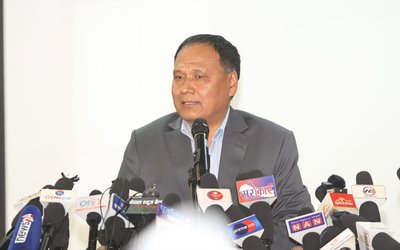
How do you see the challenges for UN Peacekeeping Mission of Nepal Army following your visit to Republic of Congo? What reform prospects do you see?
Our army started the participation in Congo since 2003. One can see a lot of change from the earlier days to now. In initial time, it was very difficult to maintain peace.
How do you observe the present state?
Although the situation has changed a lot, the ground reality, political situation and social conditions have not changed much in Congo. Nepal Army has to face all the same difficult situation arising from political, social disorder in the ground. Despite bringing the order, peacekeepers have to face new problems. However, commanders, officers and military personnel have been handling them well. All of them are fulfilling the responsibility given to them.
What gaps do you find here?
There is the need to provide the soldiers with the much-needed new equipments to enhance their efficiency and capability. Although heavy equipments are expensive, there is the need to provide them new ones. There is the need to invest some money to purchase new heavy equipment to do replacement the outmoded ones. If you send army in war, you should provide all the necessary equipments to win.
Does Nepal Army have the budget?
Since Nepal Army has been doing its utmost possible to replace the old equipments, Nepal government also needs to provide it with the necessary budget to purchase the new equipment. Not only in Congo Mission, have Nepal Army’s peacekeeping missions in different parts of the world required new equipment. Once the government provides new equipment, Nepal Army peacekeepers will be more capable to handle the situation more effectively and efficiently. As Nepal Army has proved their efficiency, the demand of Nepalese peacekeepers is growing.
How do you look at UN peacekeeping in general?
Not only Nepal, more than 200 members of United Nations want to take part in UN Peacekeeping Missions. As Nepal has its own prestige and name in the peacekeeping operations, Nepalese are given a priority. The friendly nature of Nepalese is also a reason behind their growing demand. Nepalese have shown the capability that they are friendly and can easily mingle with the local community. Nepalese peacekeepers fulfill the difficult responsibility given to them. They are disciplined and obedient as well. But, this alone is not enough in the changing context.
Don’t you think Nepal Army is still the first choice?
Of course, Nepalese are the first choice of individuals or institutions. However, the time has come to equip them. There is a debate about smart peacekeeping. The new peacekeeping operation will depend on modern and sophisticated equipment. There is the need of equipment which will give early warning and capability. We need to think about these new methods.
Peacekeepers come here under Nepal government’s permission representing Nepal. Why does the government ignore their needs of equipment?
With the request of UN, Nepalese peacekeepers are deployed in various parts of the world under the permission and decision of the government of Nepal. The contribution made by Nepalese Army will go to the government of Nepal and Nepalese people. Given the current challenging world, the government must spend money to equip Nepal Army for the personal security to soldiers. Here is the need of APC and MPC and weapon systems.
In the last five decades, Nepalese Army has made numbers of contribution how do you look at it?
Nepal Army joined UN Peacekeeping since 1958 from a small scale. Since then over 100,000 Nepalese army soldiers have participated in different UN Peacekeeping Missions around the world. There are 4000 plus Nepalese Army personnel working as peacekeepers in 16 countries. We have more experience and expertise on peace keeping than in the past.
How do you see the training?
Nepal Army has its own Peacekeeping training center to provide training to Nepal Army personnel. We also provide training to other officers of different parts of the world. It makes us easier to work in multiple forces. We provide logistic, operational and various other trainings required for peacekeepers. The training provides capability to our officers in UN and other missions as observers. Even after retirement, Nepalese Army officers are fulfilling different roles in UN peacekeeping missions.
What is required now?
We need to cash in on this goodwill. Nepal government is planning to send 10,000 peacekeepers by next year. This will also help to generate income for the country as well. If this policy works, there is the need to provide equipment. Such equipment can be used even within the country after the completion of mission.
- IME GROUP: Expands Into Paper Industry
- Mar 24, 2025
- CPN UML: Instigated By India
- Mar 23, 2025
- ADB’S CHIEF ECONOMIST: Nepal Reduces Poverty
- Mar 11, 2025
- FM DR. DEUBA: A Successful Visit
- Mar 11, 2025
- MD GHISING: Target Of Personal Grudge
- Mar 09, 2025















